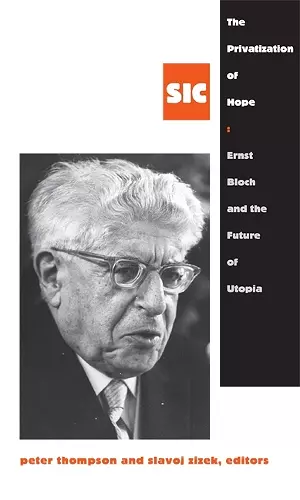The Privatization of Hope
Ernst Bloch and the Future of Utopia, SIC 8
Peter Thompson editor Slavoj Žižek editor
Format:Hardback
Publisher:Duke University Press
Published:19th Dec '13
Currently unavailable, and unfortunately no date known when it will be back

The concept of hope was central to the German philosopher Ernst Bloch's work. Here, leading thinkers in utopian studies consider the insights that his work might offer the contemporary moment.
The concept of hope is central to the work of the German philosopher Ernst Bloch (1885–1977), especially in his magnum opus, The Principle of Hope (1959). The "speculative materialism" that he first developed in the 1930s asserts a commitment to humanity's potential that continued through his later work. In The Privatization of Hope, leading thinkers in utopian studies explore the insights that Bloch's ideas provide in understanding the present. Mired in the excesses and disaffections of contemporary capitalist society, hope in the Blochian sense has become atomized, desocialized, and privatized. From myriad perspectives, the contributors clearly delineate the renewed value of Bloch's theories in this age of hopelessness. Bringing Bloch's "ontology of Not Yet Being" into conversation with twenty-first-century concerns, this collection is intended to help revive and revitalize philosophy's commitment to the generative force of hope.
Contributors. Roland Boer, Frances Daly, Henk de Berg, Vincent Geoghegan, Wayne Hudson, Ruth Levitas, David Miller, Catherine Moir, Caitríona Ní Dhúill, Welf Schröter, Johan Siebers, Peter Thompson, Francesca Vidal, Rainer Ernst Zimmermann, Slavoj Žižek
"Bloch . . . is one of the rare figures of whom we can say: fundamentally, with regard to what really matters, he was right, he remains our contemporary, and maybe he belongs even more to our time than to his own."—Slavoj Žižek, from the preface
"Late capitalism has been celebrated by its apologists as that stage of society in which nothing more, nothing new, will ever happen (except for wars, catastrophes, bankruptcy, and Armageddon): the end of history as the death of the future. In this affluent desolation, at the tail-end of all thought, we confront the immense enigmatic figure of Ernst Bloch and that tangle of the Not-Yet-Conceived—the heritage of unfinished business, loose ends, and tired aporias in which new problems are somewhere hidden, new futures slumber, and a freshening and a renewal of history is promised. The present collection makes a start on renewing Bloch himself as a living multiplicity of themes and questions, and may even mark a beginning of that new beginning with which he tantalized us."—Fredric Jameson, Duke University
“…like Bloch, contributions in this volume instil in the reader a sense that partisans are not obliged to consider contemporary states of affairs as perfected facts, as if facts amounted to the world’s completion. Instead we are guided by a transgressive thought to take up with renewed vigour Bloch’s insistence on the world’s being just as little finished as we are. . . . [T]his volume foretells of a much needed coming future engagement with Bloch.” -- Nathaniel J P Barron * Marx & Philosophy Review of Books *
"[T]he merit of this volume is that it approaches Bloch's thinking from very different perspectives, and often in an ingenious way." -- Ivan Boldyrev * Crisis and Critique *
“[T]his collection is persuasive that a return to Bloch’s writing, in spite of – or as Miller argues, perhaps precisely because of – its difficulty, is a worthwhile endeavour for anyone interested in reclaiming the utopian residues that lie beneath the ideological surface of cultural formations, perhaps in order to then understand how they might be put to work in ensuring that some human dreams for a better collective future do not remain mere fantasies.” -- Marcus Morgan * British Journal of Sociology *
ISBN: 9780822355755
Dimensions: unknown
Weight: 581g
336 pages